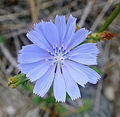Edible flower
Edible flowers are flowers that can be consumed safely by humans. Many cultures incorporate a variety of flowers into their cooking, using them to add flavor, color, and aroma to various dishes. Edible flowers can be used fresh as garnishes, infused into beverages, incorporated into salads, or even used in cooking and baking. It is important to note that not all flowers are edible; some can be toxic, so proper identification and knowledge of edible varieties are crucial.
Types of Edible Flowers[edit]
Several flowers are recognized for their culinary uses. Some of the most popular include:
- Roses: Known for their fragrant petals, which can be used in syrups, teas, desserts, and garnishes.
- Lavender: With its distinctive aroma, lavender is often used in baked goods, teas, and as a flavoring in various dishes.
- Nasturtium: Both the flowers and leaves are edible, offering a peppery taste similar to arugula, making them a colorful addition to salads.
- Violets: These have a sweet flavor and are often used in desserts, salads, or as decorations on cakes and pastries.
- Calendula: Also known as pot marigold, calendula petals have a tangy taste and are used in salads, as garnishes, or to add color to dishes.
- Chamomile: Best known for its use in tea, chamomile flowers have a mild, apple-like flavor and are also used in desserts.
Culinary Uses[edit]
Edible flowers can be used in a variety of culinary applications. They can be added to salads for a burst of color and flavor, used to decorate cakes and desserts, or infused into beverages like cocktails and teas. Some flowers, such as lavender and rose, are also used to flavor jams, jellies, honey, and other sweet treats. In addition to their use in cooking, edible flowers can be crystallized with sugar and used as elegant decorations.
Safety Considerations[edit]
When consuming edible flowers, it is essential to ensure they are safe for consumption. Only flowers that have been identified as edible should be eaten, and they should be free from pesticides and other chemicals. It is also important to introduce edible flowers into the diet gradually, as they can potentially cause allergic reactions in some individuals.
Cultivation[edit]
Many edible flowers can be easily grown in home gardens. They require the same care as other flowering plants, including adequate sunlight, water, and soil nutrients. Growing edible flowers at home ensures that they are fresh and free from harmful chemicals.
Conclusion[edit]
Edible flowers offer a unique way to enhance the flavor, aroma, and appearance of various dishes. With a wide range of edible varieties available, they can be incorporated into numerous culinary creations. However, it is crucial to ensure that any flowers used for consumption are safe to eat and have been properly identified.
-
Starflower
-
Moringa oleifera flowers
-
Gỏi bông điên điển và tép đồng
-
Muflier
-
Cichorium intybus
-
Centaurées
-
Chinese Flower Cake
-
Chocolate cake with candied violets
Ad. Transform your life with W8MD's Budget GLP-1 injections from $49.99


W8MD offers a medical weight loss program to lose weight in Philadelphia. Our physician-supervised medical weight loss provides:
- Weight loss injections in NYC (generic and brand names):
- Zepbound / Mounjaro, Wegovy / Ozempic, Saxenda
- Most insurances accepted or discounted self-pay rates. We will obtain insurance prior authorizations if needed.
- Generic GLP1 weight loss injections from $49.99 for the starting dose of Semaglutide and $65.00 for Tirzepatide.
- Also offer prescription weight loss medications including Phentermine, Qsymia, Diethylpropion, Contrave etc.
NYC weight loss doctor appointmentsNYC weight loss doctor appointments
Start your NYC weight loss journey today at our NYC medical weight loss and Philadelphia medical weight loss clinics.
- Call 718-946-5500 to lose weight in NYC or for medical weight loss in Philadelphia 215-676-2334.
- Tags:NYC medical weight loss, Philadelphia lose weight Zepbound NYC, Budget GLP1 weight loss injections, Wegovy Philadelphia, Wegovy NYC, Philadelphia medical weight loss, Brookly weight loss and Wegovy NYC
|
WikiMD's Wellness Encyclopedia |
| Let Food Be Thy Medicine Medicine Thy Food - Hippocrates |
Medical Disclaimer: WikiMD is not a substitute for professional medical advice. The information on WikiMD is provided as an information resource only, may be incorrect, outdated or misleading, and is not to be used or relied on for any diagnostic or treatment purposes. Please consult your health care provider before making any healthcare decisions or for guidance about a specific medical condition. WikiMD expressly disclaims responsibility, and shall have no liability, for any damages, loss, injury, or liability whatsoever suffered as a result of your reliance on the information contained in this site. By visiting this site you agree to the foregoing terms and conditions, which may from time to time be changed or supplemented by WikiMD. If you do not agree to the foregoing terms and conditions, you should not enter or use this site. See full disclaimer.
Credits:Most images are courtesy of Wikimedia commons, and templates, categories Wikipedia, licensed under CC BY SA or similar.
Translate this page: - East Asian
中文,
日本,
한국어,
South Asian
हिन्दी,
தமிழ்,
తెలుగు,
Urdu,
ಕನ್ನಡ,
Southeast Asian
Indonesian,
Vietnamese,
Thai,
မြန်မာဘာသာ,
বাংলা
European
español,
Deutsch,
français,
Greek,
português do Brasil,
polski,
română,
русский,
Nederlands,
norsk,
svenska,
suomi,
Italian
Middle Eastern & African
عربى,
Turkish,
Persian,
Hebrew,
Afrikaans,
isiZulu,
Kiswahili,
Other
Bulgarian,
Hungarian,
Czech,
Swedish,
മലയാളം,
मराठी,
ਪੰਜਾਬੀ,
ગુજરાતી,
Portuguese,
Ukrainian








